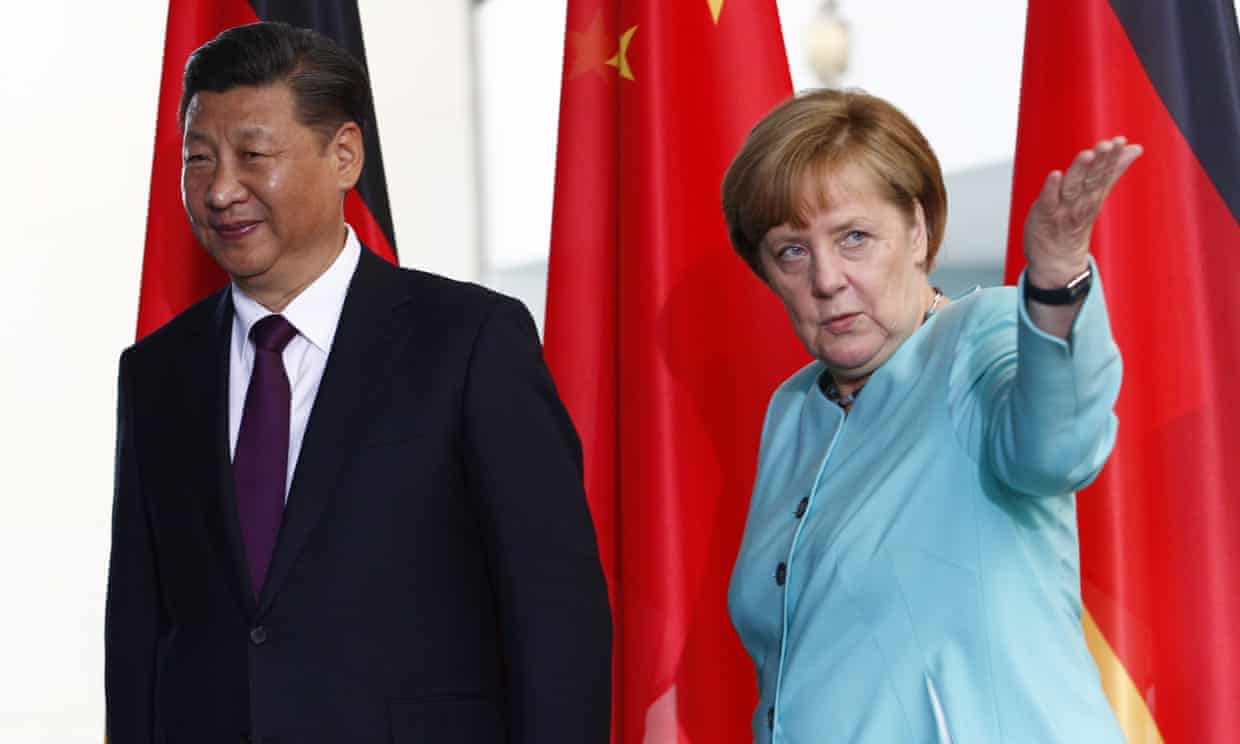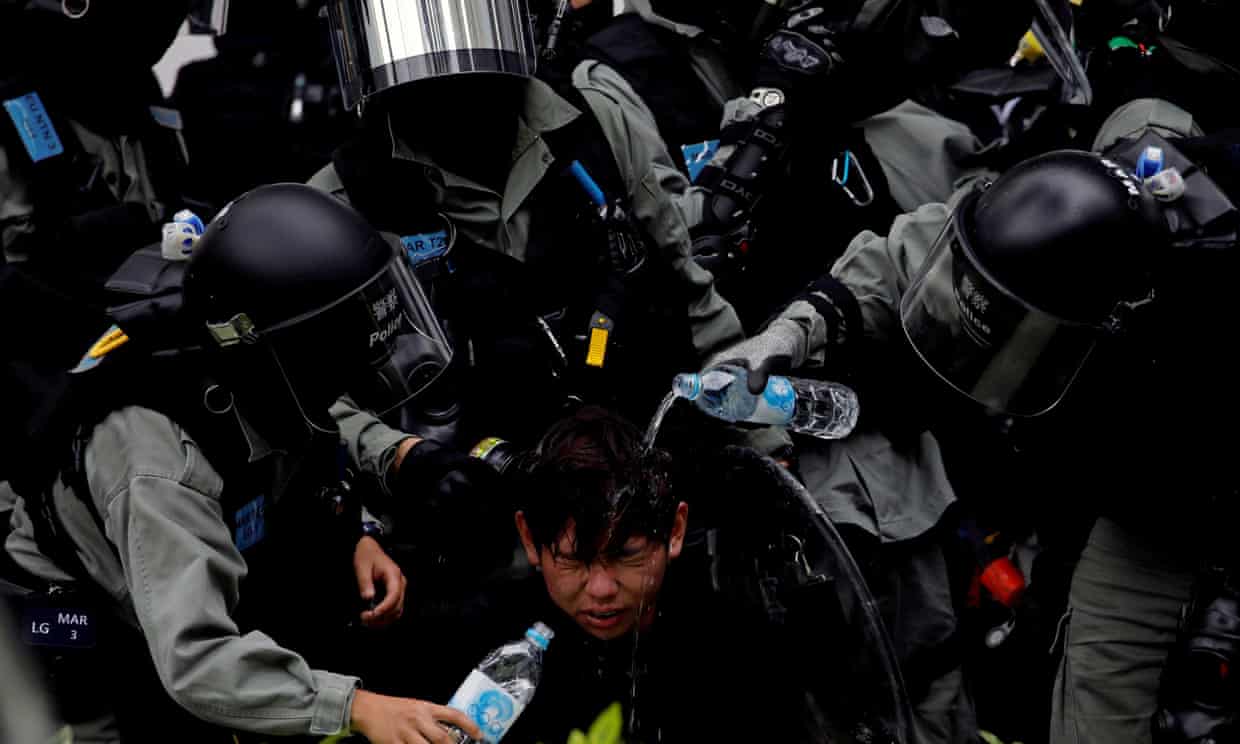
European Union
Dawn of Asian century puts pressure on EU to choose sides, says top diplomat
EU foreign affairs chief says end of US-led global system may have arrived and Europe needs robust strategy for China
by Patrick WintourThe Asian century may have arrived marking the end of a US-led global system, the EU’s foreign affairs chief has said amid a growing discussion in Europe on how to weave a path between China and the US.
“Analysts have long talked about the end of an American-led system and the arrival of an Asian century. This is now happening in front of our eyes,” Josep Borrell told a group of German diplomats on Monday, adding that the coronavirus pandemic could be seen as a turning point and that the “pressure to choose sides is growing”.
In remarks that appear to confirm that the European Union will speed up a shift to a more independent and aggressive posture towards Beijing, he said the 27-nation bloc “should follow our own interests and values and avoid being instrumentalised by one or the other”.
“We need a more robust strategy for China, which also requires better relations with the rest of democratic Asia,” he added.
The EU has been reluctant to side with Donald Trump’s confrontational stance towards China, but Beijing’s assault on the independence of Hong Kong, its growing willingness to side with Europe’s populists and its refusal to open its markets has led to a change of heart, according to analysts.
Margrethe Vestager, the EU competition commissioner and a key figure in how Europe will handle China in the future, has recently noted what she describes as a lack of reciprocity. “In the part of west Denmark in which I grew up, we were taught that if you invite a guest to dinner and they do not invite you back, you stop inviting them,” she explained. She said Europe needed “to be more assertive and confident about who we are”.
Borrell has previously admitted the EU has been naive about aspects of China, but said this was now coming to an end. In an article published this month in many European newspapers, he urged more collective discipline towards China.

Already a raft of senior politicians in France and Germany are becoming more vocal in their criticism of China, seeing echoes of Russian efforts to divide the bloc through a mixture of disinformation or pandering to rightwing populists who ideologically should be anathema to Chinese communists.
No one knows yet how far this “new realism” will take the EU in altering its economic relationship to China. Daily EU imports from China amount to €1bn (£895m), but economists say there are already signs that some trade is not returning.
On issues ranging from supply chains to telecoms security, diversification has become the watchword. Borrell has spoken of his surprise at discovering that all of Europe’s supplies of paracetamol derive from China. The German cabinet has already approved new laws to prevent foreign takeovers of medical companies. The French finance minister, Bruno Le Maire, has said “some companies are vulnerable, some technologies are fragile and could be bought by foreign competitors at a low cost. I won’t let it happen.” Sweden’s relations with China are close to breakdown.
Andrew Small, an associate senior policy fellow at the European Council on Foreign Relations thinktank, said Beijing had been able until recently to hide behind EU suspicions of Russia.
He wrote: “It benefited from the contrast that many Europeans drew between China and Russia. In this view, whereas Russia was actively hostile to the EU, China only sought to stymie European unity on a set of narrowly Sinocentric issues; whereas Russia thrived on chaos, China could be relied on as a status quo actor during crises; and whereas Russia pumped out disinformation, targeted European citizens, and sought to bring populists to power, China focused on positive image management and behind-the-scenes elite capture.”
China had after all helped Europe’s economic recovery in 2007-8 by buying debts and failing assets after the financial crash. It did not join Russia in becoming part of Nigel Farage’s Brexit chorus and it avoided support for Russia over Ukraine.
The EU’s natural desire to be tougher on China has been held back by revulsion at Trump’s methods and a fear that if Europe jettisoned China altogether, its chief partner would have to be Trump.
A key change came in spring 2019 when, frustrated by difficulties accessing the Chinese market and alarmed by the nationalist direction of Xi Jinping’s leadership, the EU labelled China “a systemic rival promoting alternative models of governance” in a landmark strategy paper. Even now it is used in evidence by the US state department for similarities to its own stance.
Many factors prompted a change of heart. The expected bonanza from China’s “belt and road” initiative had by and large failed to materialise as China’s own economy slowed down. “The period of romantic optimism had come to an end,” said Latvia’s foreign minister, Edgars Rinkēvičs. “Four years ago it was only about the economy, about trade, about the ‘belt and road’, about more investment. Now, it is more balanced.” Emmanuel Macron, the French president, in particular lobbied for the change, urging Europe to look to Russia for an alliance.
But it was not immediately clear how much the 2019 strategy paper would translate at a nation-state level. In the same month it was published, Italy became the first European country to sign a “belt and road” investment memorandum with China. Many European countries individually gave Huawei the go-ahead to run their 5G networks.
Beijing itself wanted to halt the slide in relations, declaring 2020 would be the year of Europe with two large summits and many ceremonial signings. China also continued courting eastern Europe in what has been known as the 17+1 group.
Philippe Le Corre, a nonresident fellow at the Carnegie Endowment for International Peace, says Covid has been “the game-changer” in finally altering European perceptions of China. “Chinese diplomacy backfired. It did not acknowledge the initial help Europe gave to China, perhaps due to the regime being discomforted by foreigners providing help. There were fake videos in Rome of Italians singing the Chinese national anthem. It was very strange.”
Small suggested Beijing appeared to have decided to use Europe at a moment of deep internal strain in a broad information battle about the supposed inadequacies of western democracy. “It was not enough to argue that the Chinese Communist party had succeeded; others had to be seen to fail,” he said.
Borrell called China’s “politics of generosity” a stunt and the European External Action Service, the EU’s diplomatic arm, swung into action accusing China of running a “global disinformation campaign to deflect blame for the outbreak of the pandemic and improve its international image”.
China’s behaviour has also backfired with European public opinion. A poll published by the Körber-Stiftung thinktank showed that 71% of Germans believe “greater transparency by China would have mitigated the corona epidemic”. A net 68% of Germans said their opinion of the US had deteriorated over the past year, but China’s reputation had also suffered, dropping by a net 11%. In France, an Ifop/Reputation Squad poll conducted at the end of April found only 12% saw China as best placed to meet the challenges of the next decade.
The key exception is Italy, but it has long been more sympathetic to China, and opinion appears fluid.
The question for European politicians now is how to harness this new awareness to resist China, without tumbling into Trump’s cold war. The first step is to compile what is being described as inventory of dependence on China, and investment screening reviews are now under way in France, Germany, Italy and Spain. Le Maire has promised “to strengthen our sovereignty in strategic value chains”, such as those of the automotive, aerospace and pharmaceutical industries.
The next test is China’s own direction. Veteran officials and advisers are not enamoured by what has been described as China’s “Sopranos school of diplomacy”. The Chinese scholar Lanxin Xiang admits he has kicked up quite a bit of dust by arguing it undermines China’s strategic objective of turning the EU into a buffer zone against the US.
Similarly Long Yongtu, who negotiated China’s passage to the World Trade Organization in 2001, which led to China’s astonishing economic growth, warned in May that China risked isolating itself from a new global economic order. “China is also an important participant in globalisation, so when somebody begins to talk about ‘deglobalisation’, of course, we need to be highly wary of that,” he said.
But with Trump seeking to rally the G7 – and specifically European powers – against China, using the fate of Hong Kong as his cause, China may find it is too late to get Europe to turn back.